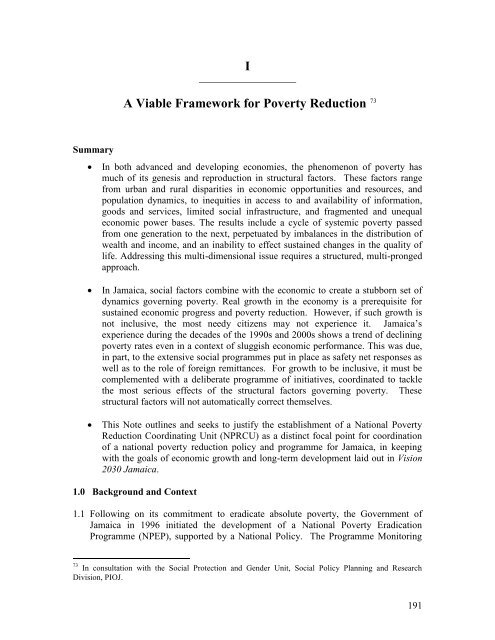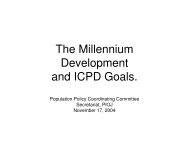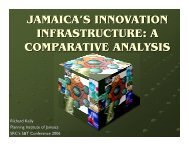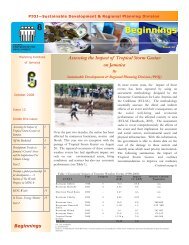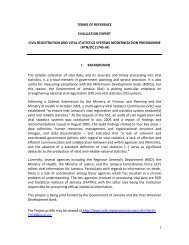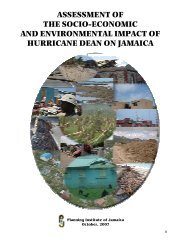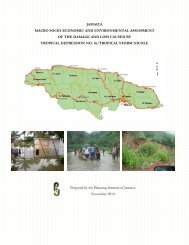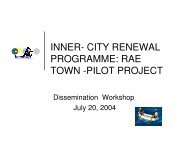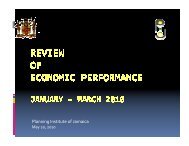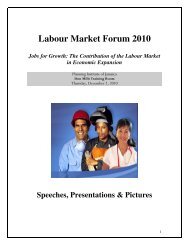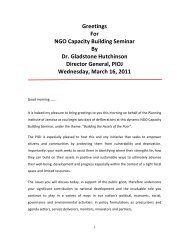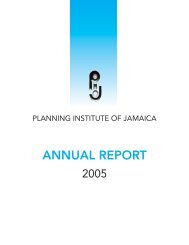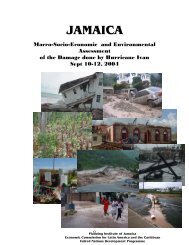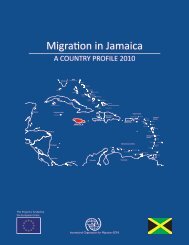PIOJ Growth-Inducement Strategy - Planning Institute of Jamaica
PIOJ Growth-Inducement Strategy - Planning Institute of Jamaica
PIOJ Growth-Inducement Strategy - Planning Institute of Jamaica
Create successful ePaper yourself
Turn your PDF publications into a flip-book with our unique Google optimized e-Paper software.
I<br />
____________________<br />
A Viable Framework for Poverty Reduction 73<br />
Summary<br />
<br />
In both advanced and developing economies, the phenomenon <strong>of</strong> poverty has<br />
much <strong>of</strong> its genesis and reproduction in structural factors. These factors range<br />
from urban and rural disparities in economic opportunities and resources, and<br />
population dynamics, to inequities in access to and availability <strong>of</strong> information,<br />
goods and services, limited social infrastructure, and fragmented and unequal<br />
economic power bases. The results include a cycle <strong>of</strong> systemic poverty passed<br />
from one generation to the next, perpetuated by imbalances in the distribution <strong>of</strong><br />
wealth and income, and an inability to effect sustained changes in the quality <strong>of</strong><br />
life. Addressing this multi-dimensional issue requires a structured, multi-pronged<br />
approach.<br />
<br />
<br />
In <strong>Jamaica</strong>, social factors combine with the economic to create a stubborn set <strong>of</strong><br />
dynamics governing poverty. Real growth in the economy is a prerequisite for<br />
sustained economic progress and poverty reduction. However, if such growth is<br />
not inclusive, the most needy citizens may not experience it. <strong>Jamaica</strong>’s<br />
experience during the decades <strong>of</strong> the 1990s and 2000s shows a trend <strong>of</strong> declining<br />
poverty rates even in a context <strong>of</strong> sluggish economic performance. This was due,<br />
in part, to the extensive social programmes put in place as safety net responses as<br />
well as to the role <strong>of</strong> foreign remittances. For growth to be inclusive, it must be<br />
complemented with a deliberate programme <strong>of</strong> initiatives, coordinated to tackle<br />
the most serious effects <strong>of</strong> the structural factors governing poverty. These<br />
structural factors will not automatically correct themselves.<br />
This Note outlines and seeks to justify the establishment <strong>of</strong> a National Poverty<br />
Reduction Coordinating Unit (NPRCU) as a distinct focal point for coordination<br />
<strong>of</strong> a national poverty reduction policy and programme for <strong>Jamaica</strong>, in keeping<br />
with the goals <strong>of</strong> economic growth and long-term development laid out in Vision<br />
2030 <strong>Jamaica</strong>.<br />
1.0 Background and Context<br />
1.1 Following on its commitment to eradicate absolute poverty, the Government <strong>of</strong><br />
<strong>Jamaica</strong> in 1996 initiated the development <strong>of</strong> a National Poverty Eradication<br />
Programme (NPEP), supported by a National Policy. The Programme Monitoring<br />
73 In consultation with the Social Protection and Gender Unit, Social Policy <strong>Planning</strong> and Research<br />
Division, <strong>PIOJ</strong>.<br />
191


